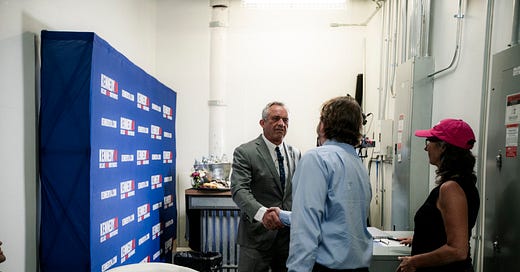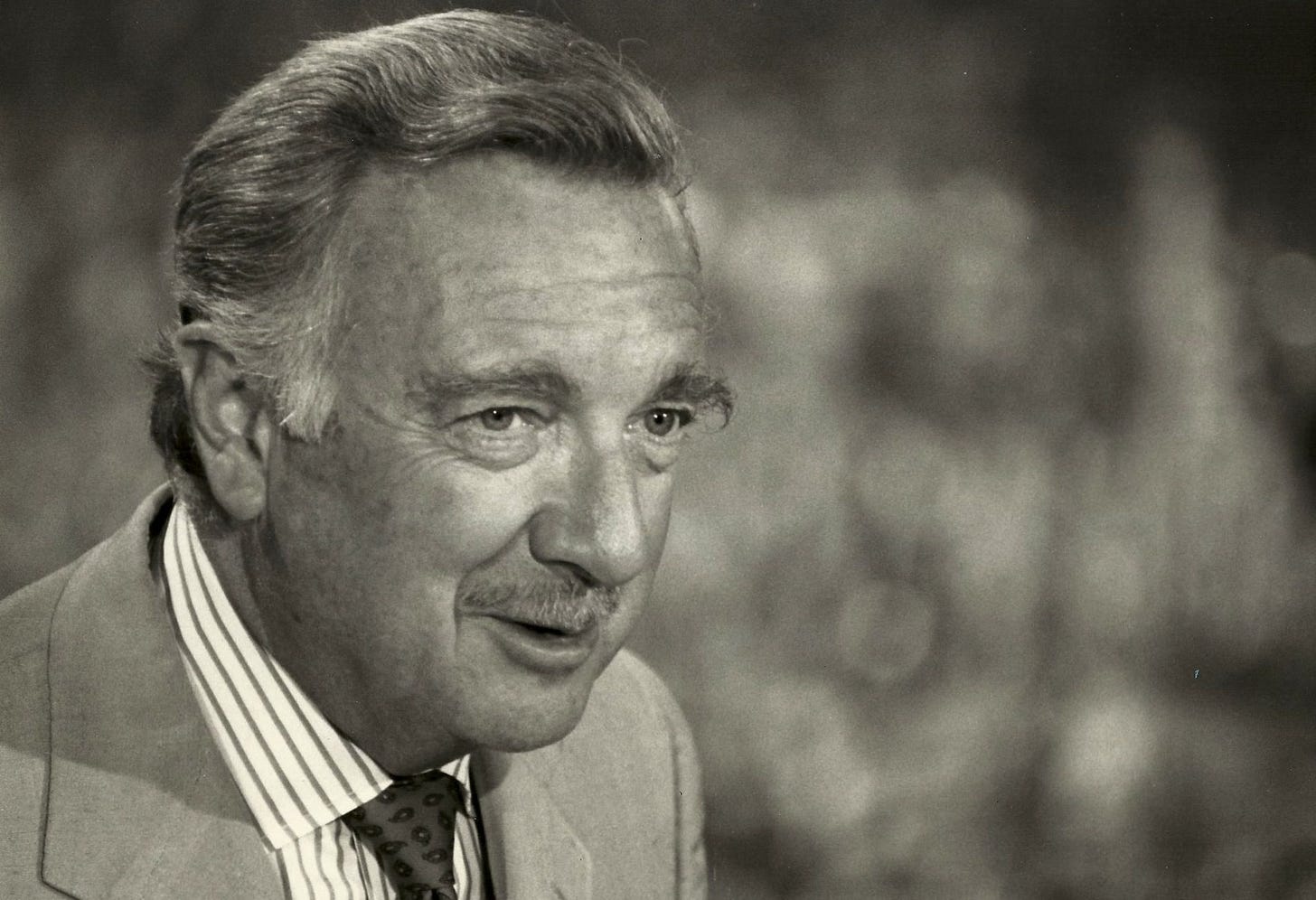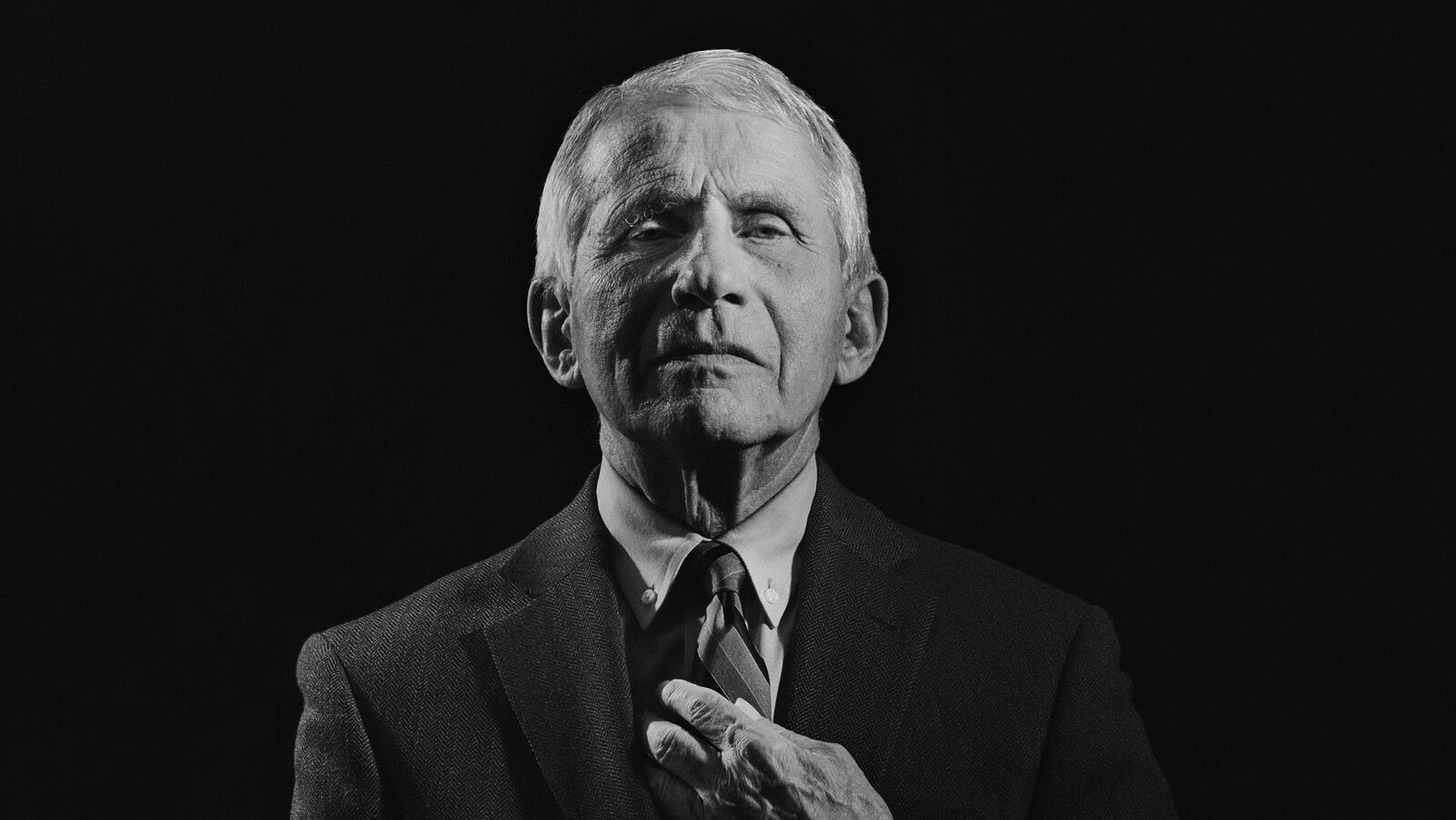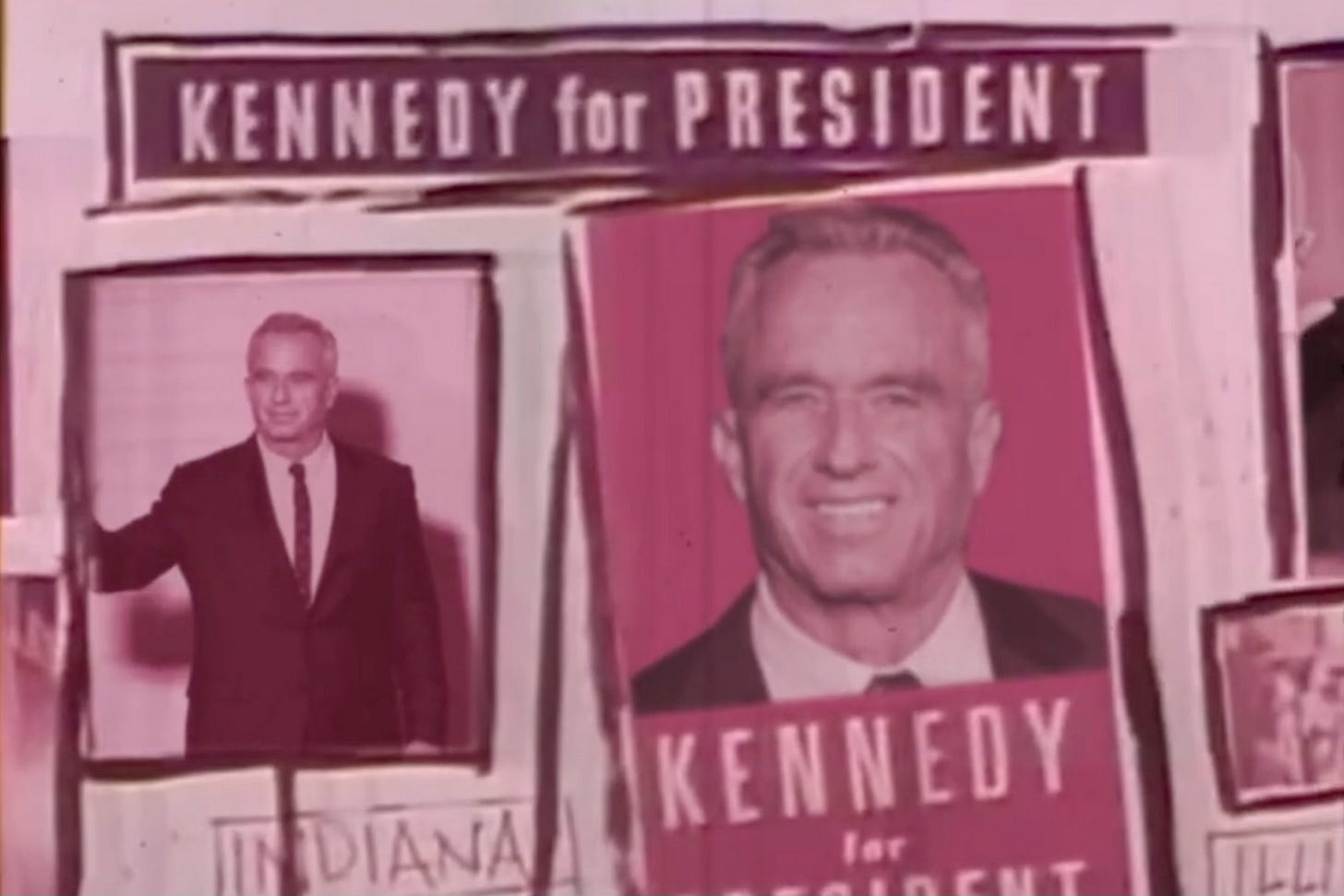An Outsider Inside the Kennedy Campaign - Politics is Different Forever
How the Robert F. Kennedy Jr. Campaign changed my thoughts about political involvement and how my unique vantage point allowed me access to the most successful grassroots campaign of the 21st century
I suppose my first memory of politics was walking into our home in Wyoming and seeing my mother watching the news. Ronald Reagan had just been shot, and the world awaited to find out just what had happened to him. I was young, but it was a very vivid memory for me. I wouldn’t say that our family was an overly political family. We watched Walter Cronkite and Dan Rather on the news, and my parents participated in their civic duties both in local and national affairs, but it was a much simpler time for politics. The information we were able to receive was controlled and managed by the national media conglomerates, and most Americans had no idea that the media and Washington were working together for their desired outcome. It still felt like it was an adversarial relationship - where one side worked to expose the other side’s deficiencies. In hindsight, and especially in light of what was found during the Church Committee hearings, it was likely a system much more managed by the intelligence agencies than anyone wanted to admit, but it at least appeared to be a government restrained by the press.
That all changed one afternoon for me as I was driving out with my dad to inspect a new project he was working on. I was 17. I had been enjoying my Political Science class in my last year of high school, and I was interested in the coming election. It was 1992, and the campaign for president was in full swing. I will never forget where we were when my dad turned on the radio, and I heard Rush Limbaugh for the first time. I said out loud after listening to him talk; “this guy is probably going to get killed for saying this!”
What I didn’t realize at the time was that Rush was activating a large swath of the American people into the political conversation. So much was changing. Cable news was in its idealistic youth, and Limbaugh was the torch bearer for what would become conservative media. Regardless of anyone’s opinions about Rush, the world changed forever with the injection of his brand of conservatism into the conversation. My dad was certainly hooked, and I became enamored as well. The election of ‘92 was probably as significant to the future of America as the Woodrow Wilson election was. It didn’t seem at the time that a saxophone playing, playing the field of interns, president would be that significant - but his embracing of corporate money for his campaign and his love of fame played upon his best Ozark instincts and he set the country on a course for uniparty rule for the next 40 years.
Rush had warned the country about Clinton, and so had a 3rd party candidate, Ross Perot. They spoke about similar issues with Mr. Clinton, but while Rush spoke about tax rates and morality, Perot spoke about things like NAFTA and China. He talked about the evaporating of American industry and troubles with the global elite running the economy. Both Rush and Perot wanted to defeat Clinton, but they were tackling different issues to do so. In the end, neither man would be satisfied, and the United States elected Mr. Clinton.
That election was my activation into politics. I liked the Rush version of the conversation. I lived in Colorado, so talking about Rust Belt impacts were not that impacting on my world. I loved Rush. He was funny and smart and had a great personality for the Radio. For those too young to remember, he was more significant to media than any podcaster today. The House of Representatives changing hands in ‘94, the creation of Fox News, and the explosion of Talk Radio were all because Rush paved the way for it to happen. My mother would send me recordings of the show when I lived in Canada, just so I could “keep up” with American politics.
I was a young “Ditto Head” all through my early 20’s. I tuned into Rush to hear what his take was on the day. I followed his thinking on nearly every issue that arose. When 2000 came around, I was behind George W. Bush and his election, and I rode with Rush and President Bush through all of the wars, the debts, and the loss of civil rights. Every decision that President Bush and his team made was the right one if Rush said they were. When the President and Rush disagreed, I sided with Rush. I had internal struggles with all of the war and destruction we were creating around the Middle East, and I couldn’t believe that Rush, who had been a deficit hawk in the 90’s, was suddenly indifferent to the debt.
In the spring of 2008, a quirky old man named Ron Paul got on the stage at the Republican Debate and began to talk about liberty and freedom. He spoke about the rights in the preamble of the Declaration, the amendments to the Constitution, the evils of war, and the degradation of our money by the Federal Reserve and deficit spending. I was married and having kids with my lovely wife, and we had spent some time traveling to Colonial Williamsburg with my family. I had heard the historic interpreters of Thomas Jefferson and Patrick Henry speak about their vision for the country. It resonated with me like nothing had in politics before. I loved the vision of America that those actors presented. So when Dr. Paul got on the stage and started speaking and sounding like the founders from Williamsburg, I was certain that Rush was going to be “all in” with Dr. Paul.
So when I tuned in after the debate and Rush said, “I would take any one of those people on the stage last night over the Democratic candidates, well, except for maybe one…” My illusions of who Rush was came to an abrupt end. He was just a different version of the media, designed to support the victory of the party more than the underlying principles. I joined the Ron Paul Revolution, was removed from my caucus in Colorado for wanting him to be elected, and my days as a Republican were over.
I learned then that politics is mostly theater, except when you are speaking about real things. The conversation has to be controlled to perpetuate the accepted path of the blob. I wrote-in Ron Paul in 2008 and 2012 and thought his son Rand was the best option in 2016. I was no fan of President Trump and his bombast. It was showbiz at its best and crass awfulness at its worst. I abstained from voting in 2016 for president, and while the outcome entertained me and I was not entirely disappointed by it, I had no thought that Trump would accomplish anything other than the perpetuation of the same that Washington always loves.
I figured the impeachments and Comey, Clapper, and Muller investigations were all just part of the same theater that always took place. They were designed for the bluster and to sell newspaper ads, but they were of no consequence to the outcome. Generally speaking, that was true. Trump attempted to make some changes, and there were positive accomplishments from his first term, but the swamp was interested in thwarting everything he tried. When COVID-19 rolled around, the machine steamrolled President Trump. His closest advisers and “friends,” including Vice President Pence, sided with the state and wreaked havoc on the American landscape. I found myself deeply frustrated with President Trump. All of his rhetoric about draining the swamp, and by March of 2020, the only person circling the drain was the president.
2020’s election was no surprise. Set aside that the entire apparatus created an atmosphere that was ripe for cheating, the reality of that election was that whether it was President Trump’s performance or the State’s nefarious actions, the outcome was predictable. Washington was not going to allow him any more time in the seat of power. He was a menace to their work, and the populist talk was too dangerous for them to continue to allow. They ultimately encouraged the lawless atmosphere that pervaded America, and January 6th was their final seal on the silent coup. There was no question in the halls of Washington that Trump was done and had no shot at ever returning.
But in my own life, all the show and trouble of the 2020 election had taken a back seat to my own family situation. The government response to Covid had become a troublesome force in my own home. My teenage children were struggling with the evaporation of their own worlds. Their programs and adventures were curtailed by a heavy-handed response that came straight from the authorities in government. We have always homeschooled our children - and that takes unique and intentional work to make sure that they have outside activities and social interactions. My oldest son in particular, who has always had his own challenges socially, suffered the most. All of his programs were canceled and day by day, the government imposed isolation drove him into darker and darker places. His sadness and anger consumed our home. Not only could politics not provide answers for our plight, but the government had been the creator of it. For the first time in my life, the political decisions of our country didn’t just hit my pocketbook in taxes, they were now a bulldozer to our way of life.
In the midst of that, my wife discovered Robert F. Kennedy Jr. and Children’s Health Defense. With each speech I listened to, I found myself feeling less isolated and less crazy about my own thoughts pertaining to what was happening. It was clear in my head that everything the government was doing was outside the bounds of what the Constitution said was their purview. Mr. Kennedy was saying boldly that people like Tony Fauci and Bill Gates were not the people to trust and were not just innocent bureaucrats or bumblers from Washington but were people who stood to gain tremendously from the pandemic and the pandemic response. I had felt it when I first heard Dr. Fauci. I didn’t like what he was saying, his smug responses to President Trump were condescending and arrogant, and I especially distrusted him because all of the people who I knew to be actively rooting for the destruction of the Trump presidency were telling everyone that Dr. Fauci was the best voice to listen to.
Dr. Fauci’s power and prestige accelerated after the election. The lack of cognitive capability in President Biden and the State’s love of blob-style governance were fertile soil for the Doctor. He was everywhere. He was the hero in the traditional media, in social media, and in the elite sectors of our society. He was the high priest for our moment, and no examination was done on his background, his past, or his everpresent conflicts of interest. He was paraded around as the hero of the moment.
And yet, from the corners of Camelot came a voice saying, “It was alright to question this nearly divine doctor.” Mr. Kennedy exposed time and time again what Dr. Fauci wanted hidden. That raspy, strained voice became one of the only ones I trusted. He permitted those of us who were looking, to say the bold part out loud: that this response, the people in authority, and the push for authoritarian control by digital IDs and vaccine passports were not just wrong but flew in the face of the individual and natural law.
My family had found its champion. As rumblings started swirling about a presidential run for Mr. Kennedy, my enthusiasm soared. I assumed he would run as a Democrat, a party I had never voted for or found much in common with, but it didn’t matter to me. He was right about the right stuff, and anyone with that deep of conviction about the Constitution and the inherent rights of man should be listened to and given the chance to make his case before the American people.
His speech in Boston was one of the best announcement speeches ever given. He laid out a path for his candidacy and vision for America, and I was hooked. This was my candidate, and I was going to do whatever I could to help him get elected. The incongruence of being a Democrat was irrelevant to me. I had never liked or appreciated that party because of my past, but I was willing, if the Party was, to go along with the Kennedy version of government.
Following the announcement however, it became abundantly clear that the Party was not a willing participant. Looking back on it, they appreciated the blob-style governance that was afforded under President Biden. They only had to manage his schedule and appearances, but the governing was up to them, and they loved it. The Democratic party made it clear immediately that they were going to make the road for Mr. Kennedy not just difficult but impossible. Rule change after rule change and dirty tricks followed by more chicanery left Mr. Kennedy in an impossible place by the end of the summer.
For many of us, the choice he was being forced into was a good one. I had hoped he would see the Democratic Party for what I had always thought it had become: a wing of corporate bidding. As rumors started to swirl about running as an independent, my enthusiasm ramped up. It felt like the right thing for America at exactly the right time. A new voice, not beholden to party interests or major donors, could come to Washington and make a difference. Certainly, it had an air of naivete to it, but it seemed like an outcome best suited for the change that America needed. Mr. Kennedy outlined again why independent thought and the dismantling of corporate capture were imperative to a successful government.
I recommitted to my efforts. I decided that I would do 95 essays - the same number as the Federalist Papers - in support of a Kennedy presidency. I wanted to tell the story of America being stolen from the people by a corrupt and nefarious government and why a Kennedy presidency was the best shot we had as a people to reclaim the stolen ground. I dug into my writing and video work. The more I did, the more I liked Mr. Kennedy. In nearly every position I could find, he took the more principled and thoughtful stance. It was not just surprising but also endearing. He spoke the way that I thought. He was an environmentalist but not a radical wacko about carbon. He was better than the other candidates on the border. Even his position on guns was the more nuanced and thoughtful one that defended the Constitution despite his own deep personal animosity for weapons that had ruined his childhood. With each speech, Tweet, or new Instagram reel, I was buying in with more conviction and commitment to a Kennedy presidency.
When the Super Bowl ad ran, my kids and I cheered loudly. It was a grassroots, guerilla-politics-style campaign, and it was fun to be a part of. My essays got his attention several times, and the campaign was kind enough to give me their contact information and access to their attention. It was really profound. I had never been this involved in politics, and I was never that consistent as a writer before this cycle. I had made some videos for my kid’s milestones, but I was not a movie maker either. I made the first 30 essays from my phone and an app.
I bought Adobe Premier in February and decided to learn how the software worked. I holed up for a few days in my office and took online tutorials about how to create movies and transitions and all the things that make films engaging to watch, and I went for it. I started writing more prolifically and making as many videos as I could. I invited guests to write essays and made movies for them. I had found something I really loved doing, and it was changing my life.
Something unique happens when you start to speak up. There is a boldness that stiffens your spine despite the opposition. Early on, I feared being found out. I was worried that my politics would interfere with my business and that my friendships might suffer because of it. Both happened. Yet, the conviction to speak up about things that mattered to my family and to my children was more important than my business or relationships that ultimately were one-sided. It is disappointing to realize that America is so divided that the support of someone for president can have a chilling effect on life. It certainly isn’t right, but it is what has become of speech in America. There is one way to think, and any alternative will have tremendous consequences. But with each new disappointment in my own world, my life and soul were uplifted by the freedom to speak my mind. I felt like I was part of a new revolution in America. This was my 1776 moment and I wasn’t going to miss it, even if it meant a realigning of my entire way of life, work, and relationships.
I met Mr. Kennedy in May of 2024, and it was one of the highlights of adulthood. I was invited to the rally in Denver to meet one-on-one with him and talk about his campaign and my thoughts on nearly everything. I found him to be genuine, kind, and interested in me. I had anticipated a mini stump speech from him to me, but instead, it was a series of questions and genuine interest in who I was and why I was interested in his campaign. I needed no more convincing that this was the best person for the presidency, but our time together made me an acolyte. He was good to my kids and especially to my Dad, who I had discussed with him wasn’t a likely Kennedy voter because of his conservatism. But Mr. Kennedy even had some fun with that and made it into a chance to open conversations with my father about why I thought Mr. Kennedy was the person we should be supporting as Americans.
As summer approached, it appeared that Mr. Kennedy was gaining momentum. His candidacy was creating problems for both the Biden and Trump campaign. His polling showed him as the only one able to win in head-to-head matchups with both men, and his poll numbers were steadily climbing. He had enough support to make the main stage of the debate. (Which had been moved up untraditionally early to address both Kennedy and the sinking numbers of President Biden) Mr. Kennedy had met the qualifications of the night but was unceremoniously dismissed by CNN. A day before the debate, I got a call from the campaign asking if I would participate in a projection art ambush all over the country. They wanted me to use my video skills to help generate movies that would be projected in Washington, New York, and at CNN headquarters. It was a really fun project and was the height of the Kennedy campaign to me. The Real Debate was a masterful stroke of technology and campaign savvy. They used their resources wisely and garnered great attention on social media. I thought the entire episode was brilliant, and I was so proud of the people who were participating.
I remember the day the campaign changed. I was working on a revised version with the music of one of the projection videos for social media consumption. It was a bit of a rush based on the campaign needs, so I scrambled to finish it in between a few moments of travel. I sent it off to my contact, and everything went quiet. A few days before, Bobby Kennedy III had posted a video of a phone call between his dad and President Trump, where the discussion had focused on vaccines. It seemed to get the campaign in some hot water, and it appeared to be a much more detailed conversation than something that had happened spontaneously. President Trump had been shot at in Butler, PA, and it seemed to have changed both the Trump campaign and the Kennedy campaign. There were rumors swirling about Vice Presidential offers and fluidity in what was happening. Something had changed, and while the campaign continued, I felt a disconnect from the contacts I had. In my mind, I attributed it to trying to avoid campaign finance violations or something, but in my heart, I understood that post-assassination attempt, the ground had shifted.
I soldiered on advocating but understood that decisions needed to be made. Piled on top of all of it was the relentless lawfare that the DNC perpetually assaulted Mr. Kennedy’s campaign with. Millions of dollars had been sucked from the coffers of the campaign to provide security for the candidate and to defend ballot lawsuits in dozens of states. When Mr. Kennedy lost case after case in his home state of New York, the disappointment on his face was palpable. It was infuriating and sad all at the same time. I texted the campaign manager the week before Mr. Kennedy suspended his campaign to congratulate them on achieving ballot access in all 50 states. Something that hadn’t been done in 30 years. My text was a bit ambiguous, and so my phone rang at dinner with Amaryllis on the other end. She wondered why I was congratulating them and that there were lots of rumors swirling about - I told them it was about getting on the ballots and apologized for my lack of clarity. Bobby was there too, and he again said his thanks to me for my help in making it all happen. It was another kind-hearted conversation and one that gave me some hope that the campaign was continuing despite the obstacles. By the end of that same week, the writing was on the wall, and my phone call from earlier that week made it clear that they were hoping I had not heard rumors of his campaign suspension.
August 23 was a watershed day. I had spent a lot of time actively frustrated with President Trump. His response to Covid, his terrible appointments in the cabinet, and his ineffectiveness at “draining the swamp” were still hard for me to get over. Mr. Kennedy had obviously had more time to debate and think about his decision, but it came with some deep disappointment for me. I wanted him to be the president, and I had worked hard to make it happen. I watched as friends I knew from X (Twitter) jumped on the MAGA train and exploded with followers. They were able to pivot quickly to this new reality and I felt quite left behind in it. Politics is a sport, but it also has conviction that surrounds it. I wasn’t ready to jump in with both feet that quickly. I loved seeing Bobby being adored by the folks in Arizona at the Trump rally and watching him walk on stage was a very emotional moment. He deserved this recognition and he was finally getting it.
Mr. Kennedy was slated to speak in Denver again at the Independent National Convention. I had tickets and wanted to meet some of my online cohorts, so I still attended. The room was somber and defeated to a large degree. Former Kennedy staffers who couldn’t go along with the Trump endorsement lamented together over it all. Del Bigtree gave a heartfelt speech about being in the room when RFK had the weight of the world on his shoulders, and the room seemed to be saddened at the thought of what could have been.
I had a hallway discussion with a former communications videographer, and we both lamented at what could have been. It was an incredibly successful campaign, but the obstacles were too great. The system that demonstrates itself to be corrupt in its governing had the same propensity to destroy the populist movements that threatened it. I was glad for Mr. Kennedy that he seemed to be getting a moment of recognition, but I remained ambivalent about the Trump promises. They had been broken before, and a promise at a cabinet position was not a guarantee of anything. Senate confirmations could still make for an obstacle that, even giving President Trump the benefit of the doubt, could be destroyed by the creatures of the swamp.
But as always, Mr. Kennedy never let the negativity of what could be stop him. He campaigned tirelessly for President Trump - and when he said that the best way to get him to Washington was to vote for President Trump, it became clear to me that this was the best and only path for this hero of mine to be put in a position of influence. It took me some time, but by the end of the second week in September, I was equally in on the election of Trump as I had been on the Kennedy campaign. The opponent was too dangerous, not for their capacity at governing but for their vapidness as a candidate. Voting for Vice President Harris was voting for the apparatus to win. That wasn’t an acceptable future for my kids or for our country. Hearing Mr. Kennedy speak at the different rallies all across the country gave me a sense that this was the right coalition to lead America.
In the closing moments of the campaign, I had a flurry of essays that came through. I worked with a lovely team of people to produce 13 MAHA Voices stories about people who were former Democrats or Independents who were voting for Donald Trump as a way to support Mr. Kennedy. I closed out the entire writing adventure with Essay 100 - Closing Argument
It was my rationale for all of what had happened. When election night finished, and it was clear that President Trump would be the winner, I texted the campaign manager and congratulated her. She responded with deep gratitude and expressed how proud I should be about my role in helping reshape politics in America.
Stepping back now and reflecting, she was right. What Mr. Kennedy did through the campaign and subsequent endorsement of President Trump changed the landscape of American politics forever. No campaign for president going forward will proceed without a discussion of the cabinet and the divergent interests that must be coalesced around to win a majority. That will mean that populist and independent interests will be elevated to a higher priority than the red meat blither that riles up the base. It will take a good campaign that acknowledges the interests of all to win the presidency going forward. The cabinet appointment process has seen more interest than any from my memory, and so the Senate will soon have its own populist spotlight shined upon it. America just experienced a new revolution. Our flirtation with a permanent version of one-party rule and apparatus permanence seems to have met heavy resistance and an awakened public. Nothing could be better for America.
Thank you, Mr. Kennedy, for everything. My life, my children’s lives, and the soul of a country were changed forever by your involvement. I hope that when the dust settles, America will be healthier. Not just in our waistlines but in our civic involvement, too. There are positive indications for both.


















A beautiful recap of political change and awakening! Aaron, thank you for giving voice to so many developments in the historic 2024 election cycle. I’m grateful for your many essay contributions. Well done!
Thank you Aaron for your articulate essay! This way the first political campaign I have ever participated in and it was an incredibly grueling process because of the media. Your videos and essays were the inspiration I needed to keep going as friends and family turned against me for supporting Kennedy. I pray that he is confirmed !